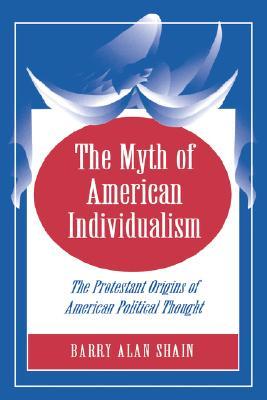A popular belief about the founding era is that America was a society of atomistic individuals. All that Americans demanded, according to myth, was that their life and property be protected by government; the remainder of their affairs was to be their own concern, Barry Alan Shain, in his new book The Myth of American Individualism: The Protestant Origins of American Political Thought, systematically debunks this libertarian fiction by appealing to primary sources, such as sermons and political tracts, to which most Americans were regularly exposed.
Rather than focusing on the commonly held ideas and beliefs of the elite, Shain examines those of ordinary Americans. The key to understanding the attitudes of the common man, and the nexus of the book itself, is reformed Protestantism. In Shain’s view, Calvin rather than Locke shaped the colonists’ thought as they contemplated separation from Great Britain. Certainly the Founders were influenced by the likes of Algernon Sidney and Montesquieu, but the farmer and craftsman had little or no knowledge of their works. The common people knew their Bibles, Hymnals, and Almanacs. Theirs was a world in which original sin kept man from the possibility of enjoying absolute liberty.
Thus ordinary citizens expected their neighbors and local governments to be involved in their lives as they sought to do their paramount duty: service to God. Shain concludes that they believed that “God was best served by a community of believers mutually and reciprocally ensuring that they chose his ways over the siren calls of the flesh.” In light of this reformed Protestant belief, early America could have been nothing but localist and communalist.
If this is the ease, how did the myth of American individualism develop? Shain postulates that at the heart of the misunderstanding lies language. What 17th and 18th-century Americans meant when they spoke of liberty is entirely different from the modern understanding of the word. Whereas liberty is now defined as the freedom to do as one pleases, our ancestors saw liberty as the freedom to “do all the Good we can in our Places, to serve GOD and our Generation.” Unless one understands this, it is easy to interpret their words in a libertarian sense.
Shain also blames two of America’s most prolific foreign guests—Tocqueville and Michael Chevalier—for much of the confusion. Tocqueville described individualism as the tendency of the American “to sever himself from the mass of his fellows and draw apart with his family and friends.” Shain correctly observes that Tocqueville was describing localism, or familialism, rather than individualism, and notes that “individualism” was not in the English language until translations of Chevalier and Tocqueville’s works appeared. Had something akin to modern individualism existed in America, there no doubt would have been a word to describe it before the 1840’s.
The fact that America was essentially communal does not, however, mean that Americans were not leery of centralized power. Though Americans of the founding generation expected their local governments and neighbors to have a say in their affairs, the national government was given no such power. Shain sees American federalism as evidence of the preponderance of localism. Under the Constitution, the national government was simply to provide for defense and secure free commerce among the several states. The states and local governments retained their police powers to regulate the health, welfare, and morals of the citizenry.
Shain’s study of America’s communal past is a fascinating work that does much to expose the hollowness of early American individualism.
[The Myth of American Individualism: The Protestant Origins of American Political Thought, by Barry Alan Shain (Princeton: Princeton University Press) 394 pp., $39.50]

Leave a Reply